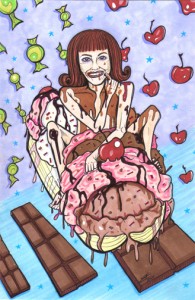I’ve been listening to The Carpenters for three days straight. Does that make me a pansy? Of course not. These are sentimental love songs from a woman to a man—well, from Karen to me—and that’s miles from the pink-zone. Karen’s motherly voice pours suburban melancholy into my open wounds. I dare any road-hardened man to sit by himself—with a fifth of whiskey and a loaded gun—and listen to “Solitaire” as many times as I have. You’ll never make it out alive.
Karen Carpenter’s biography is as heart-wrenching as her wistful tenor. Her musical virtuosity was matched only by her willingness to be a victim to her controlling family, her conniving husband, and ultimately, to her own maniacal vanity, for which she starved herself to death. Randy Schmidt’s new book, Little Girl Blue: The Life of Karen Carpenter, weaves first-hand accounts of Karen’s futile quest to become a grown woman, which ended in her childhood home on February 4, 1983, at age 32.
Aside from being the hottest soft rock act of the 70s, Karen and Richard Carpenter were international icons of whitebread normalcy. The Prince and Princess of Square Perfection. Even with multiple hits on The Hot 100, the Carpenters lived with their smothering mother in Downey, CA into their mid-20s. When they finally struck out on their own, it was to move into a house together a mile down the road. Karen’s doorbell rang to the tune of their classic wedding song, “We’ve Only Just Begun.” Both siblings were too absorbed in their own careers to maintain long-term relationships, which prompted continuous allegations of incest. Richard went on to date his cousin, dispelling such nasty rumors.
A hyperactive overachiever, Karen toured with her brother incessantly. She sold over 100 million records, amassed about that many Mickey Mouse toys, and won hearts from Kansas to Japan. This worldwide success was never enough, though. All she wanted was to find Mr. Right and start a family. Karen was 30 when she met Tom Burris, a blond dreamboat with a picket fence smile—who had lied about his vasectomy, bullied her relentlessly, and milked her for millions of dollars. Karen had questionable eating habits for much of her life, but after Tom she just withered away. She died the day their divorce was to be finalized.
There is an old joke that if Karen Carpenter had eaten “Mama” Cass’ ham sandwich, they’d both be alive today. Of course, only a heartless monster would retell it. Anorexia is no laughing matter. Most American women are afflicted at some point in their lives. Mothers, wives, sisters, daughters. Just imagine the torment.
For Karen, the Passion Play opens in her pudgy teens. She goes on the popular Stillman Diet: drink eight glasses of water a day, cut out carbs, lose a few pounds. Years later, she sees herself on TV. There is a slight paunch beneath her dress. The whole world is watching! She has to be perfect. So she starts eating laxatives. Boxes of them. Hides them in her pillowcases, in her shoes. She burns a thousand calories a day running to the bathroom. Her family begs her to eat, so she nibbles a shrimp salad to make Mommy proud—then crams a finger down her throat.
Her discipline is extraordinary. She restrains physical desire like an ascetic Hindu yogi. Count down to Absolute Perfection. 110 lbs. 95 lbs. 80 lbs. Why does she look so bloated in the mirror? Walk, walk, walk. Walk to buy more sneakers. Eat a raw mushroom, a leaf of lettuce, a grain of rice. Drink ipecac syrup to throw it back up.
Karen has to stay lithe and sexy for Prince Charming. She works so hard, her knuckles are scarred by yellowing, brittle teeth. Veins bulge beneath sallow flesh. As her hormones go haywire, fine hairs sprout from every pore. Her breasts wither away. Her periods stop. The life goes out of her deep, brown eyes.
The glamor is unbearable. Exhausting. She naps backstage, then springs up to sing, looking like Golem in a sparkling dress. Everyone is picking her apart. One more laxative. One more shot of ipecac. Then one day she goes asleep naked in her walk-in closet—surrounded by clothes that make her look fat—and never wakes up.
A thousand mourners attend her funeral. Tom Burris chucks his wedding ring into her casket. Mommy and Richard go on television to tell the sobbing world. Karen is resurrected as a Self-Abuse Superstar. Anorexia becomes a talk show buzzword for decades. Women, especially Oprah, are now empowered. Cue curtain. Go house lights.
Who was responsible for Karen’s senseless death? Blame the music industry for wearing her down to the bone. Blame the media for idealizing skinny-minis like Twiggy and Olivia-Newton John. It was her family’s fault for allowing it to happen. It was your fault for making fun of fat people. And even with all of this cruel weight bearing down on her, it was Karen’s fault for starving, walking, and barfing herself to death. Did no one think to blame God?
The social pressure to be beautiful is a cruel quirk of evolutionary processes. Put a slender girl beside a fat old lady, and studies show—surprise!—most males respond to the girl. Aside from the occasional Oedipus Complex or leather boot fetish, men generally prefer younger, more fertile women, and as a woman gets older she tends to put on extra weight. It is no wonder, then, that a young woman would exaggerate her youth, and an older woman would try to imitate it. Male attraction has shaped our gene pool since the Apes of Eden.
By Nature’s “perfect” design, a woman will snag a man during her nubile years and make babies, thus perpetuating the race. The father, now bound by his heartstrings, grows to love her Willendorf curves, and sticks around to rear his young in that cozy bastion once known as a “family.” But Nature is a messy bitch.
Humans have countless layers of thought, culture, and circumstance twisting these ancient instincts into various bizarre aberrations. Today’s barren, postmodern mating game requires rigorous maintenence. Techniques that were arcane in the 60s—crash diets, laxatives, diuretics, binging-and-purging—are now common practice for millions of females in America and Europe. How ironic that a woman would strive for ideal beauty and perpetual youth by starving herself until her health—the very essence of sex appeal and fecundity—is irrevocably dried up. People are kooky animals.
In life, Karen Carpenter was considered the model of American perfection. In death, her psychological affliction was plundered for the sensationalist freak show. A made-for-TV movie. An A&E Biography. A Current Affair. An article by me. Perhaps the most disturbing disorder is our morbid fascination. Rainy days and Mondays find us waiting for the media’s obituary parade, perhaps with a vague yearning to see our own names sparkling among the dead.
© 2011 Joseph Allen


